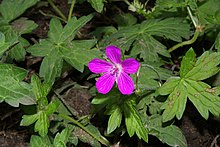| Geraniales | |
|---|---|

| |
| Geranium palustre | |
| Scientific classification | |
| Kingdom: | Plantae |
| Clade: | Tracheophytes |
| Clade: | Angiosperms |
| Clade: | Eudicots |
| Clade: | Rosids |
| Clade: | Malvids |
| Order: | Geraniales Juss. ex Bercht. & J.Presl[1] |
| Families | |
Geraniales is a small order of flowering plants, included within the rosid subclade of eudicots. The largest family in the order is Geraniaceae with over 800 species. In addition, the order includes the smaller Francoaceae with about 40 species. Most Geraniales are herbaceous, but there are also shrubs and small trees.
Flower morphology of the Geraniales is rather conserved. They are usually perfectly pentamerous and pentacyclic without fused organs besides the carpels of the superior gynoecium. The androecium is obdiplostemonous. Only a few genera are tetramerous (Francoa, Tetilla, Melianthus). In some genera some stamens (Pelargonium) or a complete whorl of stamens are reduced (Erodium, Melianthus). In the genera Hypseocharis and Monsonia there are 15 instead of the usual ten stamens. Most genera bear nectariferous flowers.[2] The nectary glands are formed by the receptacle and are localised at the bases of the antesepalous stamens.[2][3]
The economic importance of Geraniales is low. Some species of the genus Pelargonium (Geraniaceae) are cultivated for their aromatic oil used in the perfume industry. Some other species, also mostly within Geraniaceae, have horticultural or medicinal uses. A Paleobotanic record is missing.
- ^ APG III 2009.
- ^ a b Jeiter, Julius; Weigend, Maximilian; Hilger, Hartmut H. (2017-02-01). "Geraniales flowers revisited: evolutionary trends in floral nectaries". Annals of Botany. 119 (3): 395–408. doi:10.1093/aob/mcw230. ISSN 0305-7364. PMC 5314648. PMID 28025289.
- ^ Jeiter, Julius; Hilger, Hartmut H; Smets, Erik F; Weigend, Maximilian (2017-11-10). "The relationship between nectaries and floral architecture: a case study in Geraniaceae and Hypseocharitaceae". Annals of Botany. 120 (5): 791–803. doi:10.1093/aob/mcx101. ISSN 0305-7364. PMC 5691401. PMID 28961907.